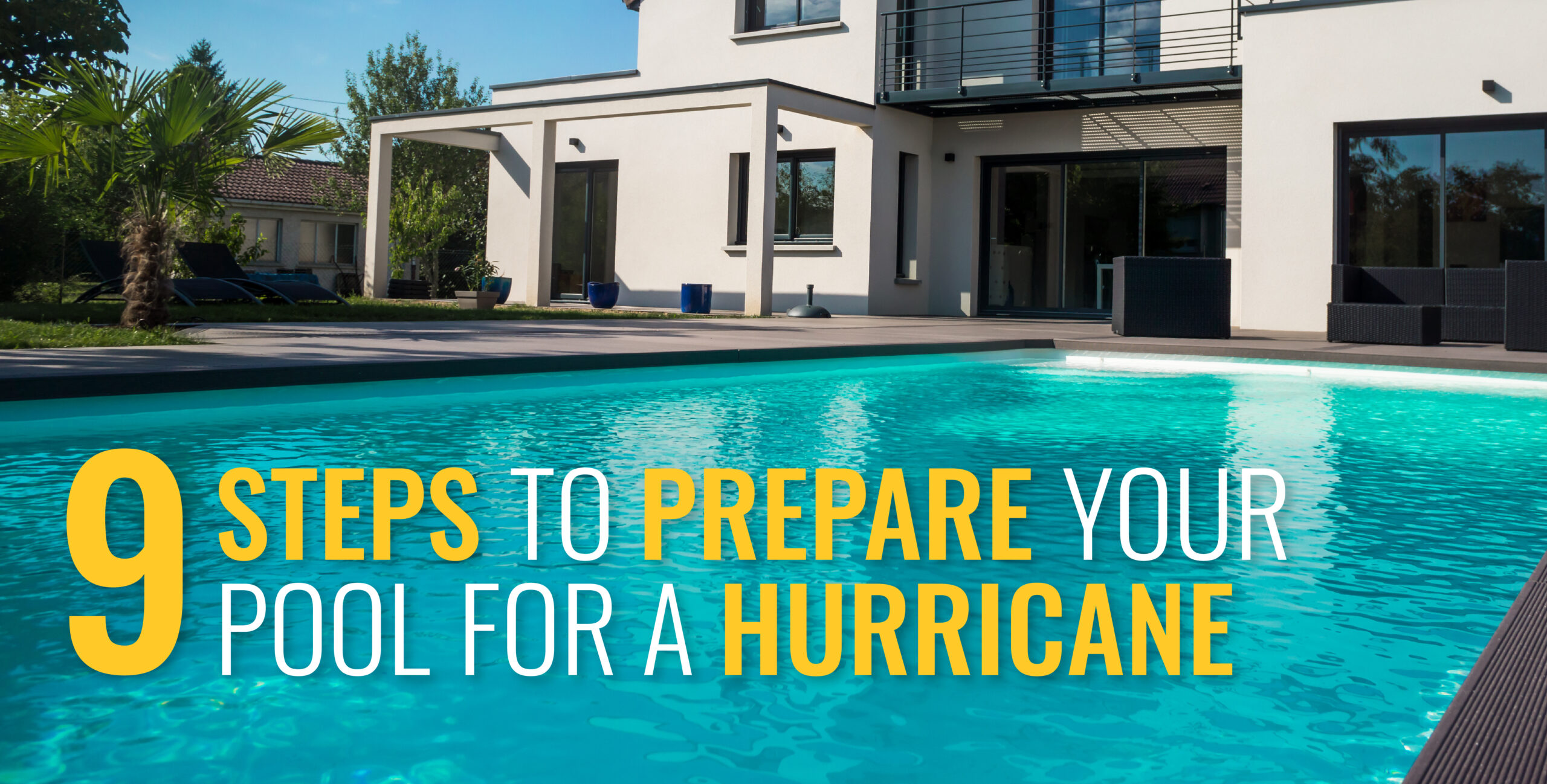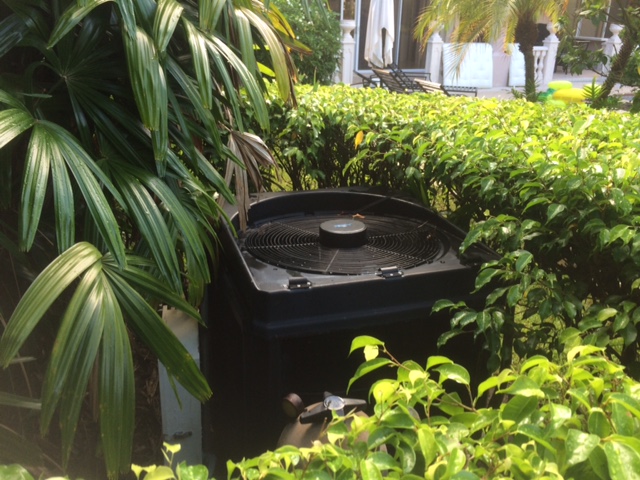As hurricane season approaches, it's crucial to ensure the safety of your property, including your…

What is The Highest Temperature a Swimming Pool Heat Pump can Heat To?
One of the many advantages of having a swimming pool heat pump is being able to extend your swimming season. Those of us fortunate enough to live in warm weather can utilize our swimming pools year round thanks to heat pumps. For people who live in colder temperatures a swimming pool heat pump can help you extend your season well into the fall or even winter months. That being said, a lot of people wonder how high in temperature a heat pump can heat to, we will answer that question for you in this article.
This is a very common question from those looking to heat a swimming pool or spa. Typically, most homeowners look for about a 10° degree rise from the outside temperature to the swimming pool. We have seen most pools at a temperature of 86°-88° degrees Fahrenheit (30°-31° Celsius), but have known some to get in the upper 90°s (32° Celsius). Most spas are heated higher than that, some even to the limit of 104° degrees Fahrenheit (40° Celsius) All heat pumps have a limit of 104° (40° ) for safety reasons.
Location
Location of your swimming pool and weather conditions also play a big role in determining the efficiency of your heat pump and ultimately the temperature that you will be able to achieve. The more warmth and humidity in the air the more efficient the heat pump will be.
Other important factors that could affect temperature are things like water features and wind conditions. Solar pool covers as well as liquid pool covers will assist in trapping the heat in the pool.
Size
Properly sizing your swimming pool to the correct heat pump is also a very important step. You want a unit that is not undersized, as this would not provide you with the power you would need to achieve the temperature you are striving for. If you would like our help sizing your pool please click here
In Conclusion
As you can see by this article, there are many factors that influence the temperature to which a heat pump can heat your swimming pool or spa. Ambient temperature, water features, wind conditions, all of these play a role. There are options available to maintain the heat created such as solar covers and liquid covers for example help.
If you have any other question regarding this article or any of our other articles please do not hesitate to contact us or leave a message, we would love to hear from you!




Hi, what is the max ambient temp that the heat pump can work at… i have a greenhouse, and i want to extract the extra heat to.my fish pond. So if its 40c in my greenhouse or even higher, will the heat pump function ? i want 30c in my fish pond but in a short time, so i figured if i have a high ambient temp, it will be very efficient in transferring the heat. will this work ? if the pond reaches 30 then the heat pump will switch off… im just wondering if im understanding it correctly… will the heat pump still be efficient even if the ambient temp is way above the desired water temp in the pond?
Hello RJ,
Heat pumps are most efficient when the ambient air temp is higher. Heat pump are less efficient when air temps are lower, i.e. below 10 c. If you set the desired temp for your fish pond at 30 C, the heat pump will shut off when the water temp reaches 30 C.
AquaCal Tech Support.
What is the maximum heat that the skin of a Bestway above pool can with stand without causing any damage please? Is it 30 degrees?
Hi Patricia,
You need to reach out to Bestway Pools for that answer.
Thanks,
AquaCal Tech Support
How to change reading from Celsius to Fahrenheit
To change the display from Celsius to Fahrenheit, hold the up and down arrows (both at the same time) until the message CF1 is displayed. Then, press the up arrow to change it from “0” to “1”.
Now your heat pump is programmed for Fahrenheit.
What is the typical temperature rise of the return water from a heat pump. I’m only getting a 3 degree rise at this time.
Two to four degree rise is normal and optimal performance of an AquaCal pool heat pump. The factor that affects water Delta-T is water flow and outside air temperature. Low flow can cause a high water Delta-T. A high water Delta affects the efficiency of a heater because it means that the heat exchanger is spending too much time on the water and super heating it, which means it’s not operating in its optimal efficiency parameters. Outside air temperature plays a role in water delta because the AquaCal swimming pool heat pump takes the heat out of the air transferring it into the pool. Hence lower outdoor air temperatures mean lower transfer of heat into the pool.
Glad you found them useful.
I have a Hayward gas heater for my pool. The maximum temperature the heater goes to is 90 degrees, I would love to keep my pool open for the winter but 90 degrees won’t be warm enough ( I’m in Ontario Canada) Is there anyway for me to jailbreak the heater so I can set the temperature to at least 100-102 degrees
Good Afternoon Diane,
Hope you are doing well. Most heating units have a maximum desired temperature setting of 104 degrees F’ as dictated by most countries’ federal law for safety.
If you cannot set the desired temp above 90 on the Hayward Gas Heater. I would recommend contacting them to see if there is an issue with the control panel or control board on the heater.
Thanks
Robert Brown
Hi,
My heat pump for my inground pool will net set above 87 degrees. The pool installer stated this is because of the vinyl liner warranty. Have you ever heard of this? Rheem heat pump, saltwater pool, Aquamax liner. Thank you
Hi Valerie,
It would be best to call the manufacturer, Rheem, for the answer.
Thanks,
I'm staying at a rental home in Davenport Florida near Orlando . The owner says there is Florida law requiring pools not to be over 89 degrees .have looked at pool laws gov sites. Not. And since it is cool
outside the pool is def COLD . Is there such a law ?
Hi there – I live in Tenerife and we are being told by the "president" of our complex that the temperature of the pool (which at present is quite cold – the heater is only on during the day) cannot be increased due to the chemical balance. He states that a few years ago people were getting purple hair and nails due to the water being too warm. I pointed out to him that other complexes´ pools were much warmer than ours and he responded he just left it to the experts.
Could you give me some advice as to the accuracy of this information please? Do his "experts" need to be educated?
Hello Jan,
Many people heat their swimming pools to comfortable levels during the cooler months without adverse effects like purple hair and nails. This would most likely be caused by pool chemicals, not heat. Raising the pool water temperature will increase the demand for chlorine to maintain a sanitized swimming pool, but this should not cause purple hair and nails.